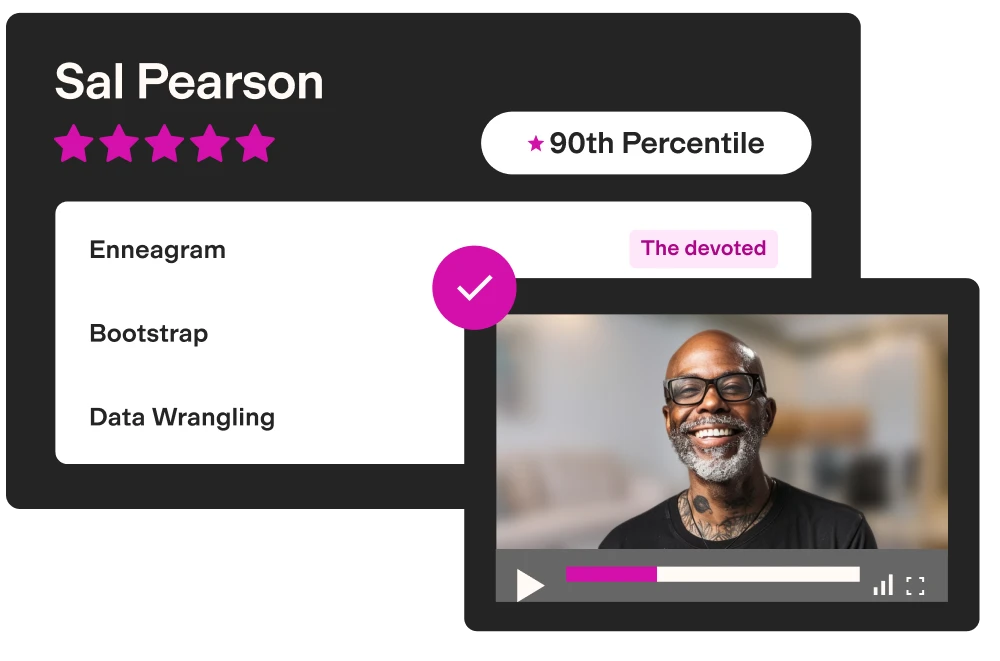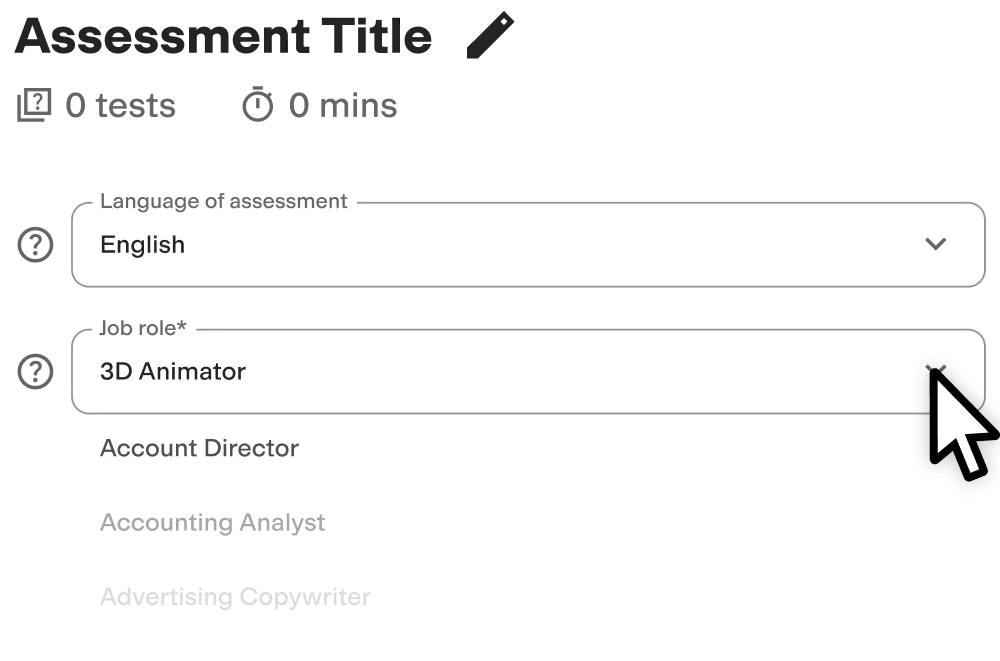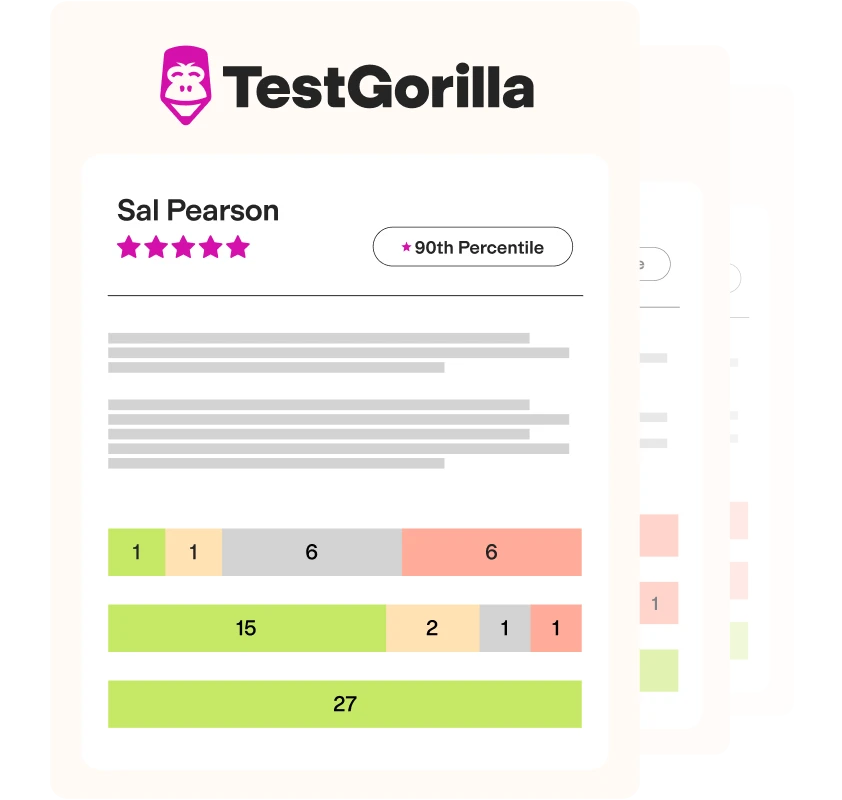Dutch B1 (Intermediate) test
Summary of the Dutch B1 (Intermediate) test
The Dutch B1 (Intermediate) test evaluates a candidate’s Dutch proficiency at the B1 level of the CEFR framework. This test will help you hire employees who can communicate in Dutch on subjects commonly encountered at work and in everyday life.
Covered skills
Grammar
Vocabulary and spelling
Reading comprehension
Listening comprehension
Use the Dutch B1 (Intermediate) test to hire
Customer support agents, sales representatives, and other employees who need an intermediate level of Dutch to perform well in their roles.
About the Dutch B1 (Intermediate) test
Employees with the ability to communicate in Dutch at the intermediate level will help improve your company’s internal and external communications by removing language barriers and improving the flow of information and collaboration among colleagues and to and from customers.
The Dutch B1 (Intermediate) test evaluates a candidate’s ability to communicate at the B1 level of the Common European Framework of Reference (CEFR) for Languages. The test evaluates candidates in the areas of grammar and vocabulary, sentence composition, reading comprehension, and listening comprehension.
Employees who can speak the Dutch language at an intermediate level can communicate with customers, colleagues, and other stakeholders comfortably around daily situations that can arise in the workplace. The texts and sentences used in the test mimic real-life situations at work and everyday life. Those who score well on this test will be able to understand simple, connected sentences on topics that are generally familiar.
The test is made by a subject-matter expert
TestGorilla’s tests are created by subject matter experts. We assess potential subject-matter experts based on their knowledge, ability, and reputation.Before being published, each test is peer-reviewed by another expert, then calibrated using hundreds of test takers with relevant experience in the subject.
Our feedback mechanisms and unique algorithms allow our subject-matter experts to constantly improve their tests.
Antoinette H.
Antoinette has one passion: sharing the Dutch language and culture with people from all over the world. A native of Amsterdam, she’s been involved in several creative language projects, such as book and song translations. She currently works part-time at SoundHound, an audio and speech recognition company based in Santa Clara, California.
A certified TOEFL instructor with several years’ teaching experience, Antoinette enjoys giving one-on-one English lessons online to students of all ages.
Use TestGorilla to hire the best faster, easier and bias-free
Our screening tests identify the best candidates and make your hiring decisions faster, easier, and bias-free.
Create high-quality assessments, fast
Building assessments is a breeze with TestGorilla. Get started with these simple steps.
B1 Dutch proficiency test helps you find top Dutch speakers
The Dutch B1 (Intermediate) test will help you evaluate candidates’ fluency in the Dutch language.
It’s challenging to find candidates who have not only expertise in Dutch but also the business knowledge needed to succeed in the role. On top of that, multiple factors negatively impact the recruitment process, making it even more difficult to find the right applicants:
• A limited candidate pool. Even though companies are receiving more applications for open positions than ever before, there’s a massive shortage of quality applicants in these large candidate pools. The ease with which candidates can apply for open roles has enabled many of them to take a “shotgun approach,” applying to many positions without looking at the requirements in detail and hoping that one of their applications will bring positive results. The current market is deeply lacking quality applicants relative to the size of the candidate pool, and organizations are struggling to find the talent they need to manage growth efficiently.
• Hiring bias. The hiring process is prone to multiple unconscious biases. From the halo effect to confirmation bias, various biases affect hiring managers’ hiring decisions. It’s not uncommon to see false positives – when a hiring manager thinks a candidate is a good match for the role when, in fact, they’re not. Bias can also result in many false negatives that cause candidates who are actually qualified for the role to be rejected.
• The unreliability of resumes. Last but not least, most hiring processes rely too heavily on resumes to assess applicants’ skills. Most candidates aren’t evaluated based on their ability to handle the tasks they would complete in the role but rather their ability to write a good resume. That’s why there’s such a significant mismatch between candidates’ resumes and their actual skill set.
Fortunately, you can solve all of these problems by using a pre-employment test like the Dutch B1 (Intermediate) test.
Evaluate critical language skills with this Dutch B1 (Intermediate) test
With the Dutch B1 (Intermediate) online skills-based test, you can evaluate your candidates’ abilities in the Dutch language. This pre-employment test will provide you with precise data on your candidates’ skills.
Our test is based on the Common European Framework of Reference for Languages (CEFR) and is designed to verify if candidates have B1-level skills in the Dutch language.
The test lasts for 10 minutes and assesses whether candidates have the four fundamental skills needed to understand and communicate effectively in Dutch:
• Grammar. The grammar section of the Dutch B1 (Intermediate) test will evaluate if applicants know how to write in the Dutch language at the B1 level. It will verify whether the candidates can write their ideas clearly and coherently in Dutch.
• Vocabulary and spelling. The test assesses candidates’ vocabulary and spelling to determine if they can form coherent and clear sentences in the Dutch language at the required level.
• Reading comprehension. This part of the Dutch (Intermediate/B1) test requires applicants to decipher Dutch text. They will have to read and understand the meaning of simple sentences on familiar topics.
• Listening comprehension. This is the most difficult part of learning any language. Candidates must be able to listen to native speakers and understand what they’re saying. They will need to understand various idioms and language complexities if they want to pass the listening comprehension part of the test.
The Dutch B1 (Intermediate) test will make it easy for you to gather data, evaluate if your candidates have a satisfactory skill level in the language, and make a data-driven hiring decision.
Candidates who do well on the test are suitable for roles like customer support agents, sales representatives, and other openings that require Dutch language knowledge at a B1 level.
Why you should use this B1 Dutch fluency test for skills-based hiring
When you use a pre-employment test like the Dutch B1 (Intermediate) test, you’ll solve many of the challenges you normally face in your hiring process.
With the limited talent pool and many unconscious biases that affect the hiring process, it’s not uncommon for companies to hire the wrong person for the role. Organizations only notice the problem after the employee spends a couple of months in the role. Then these companies need to restart the hiring process and figure out what to do with the unqualified employee.
TestGorilla helps you solve problems like this with its pre-employment assessments. You can eliminate bias from the hiring process by giving all of your candidates a pre-employment test and then waiting for the results.
It’s no wonder that 5,800 businesses, including Sony, PepsiCo, Bain & Company, Oracle, Revolut, and H&M, use our pre-employment assessments to solve their hiring process problems.
TestGorilla offers a massive library of more than 230 online skills-based tests that will help you evaluate your candidates based on their actual skills – not their resumes. Our pre-employment tests are divided into seven distinct categories:
• Cognitive ability tests
• Language tests (such as the Dutch B1 proficiency test)
• Personality and culture tests
• Programming skills tests
• Role-specific skills tests, such as the Fundamentals of Electricity test, Content Strategy test, Warehouse Supervisor test, and many others.
• Situational judgment tests
• Software skills tests
So when you’re looking to hire a candidate for any role requiring B1-level Dutch language skills, don’t leave it to chance. Use a pre-employment test and hire the most qualified candidate from your talent pool.
FAQs
View a sample report
The Dutch B1 (Intermediate) test will be included in a PDF report along with the other tests from your assessment. You can easily download and share this report with colleagues and candidates.







